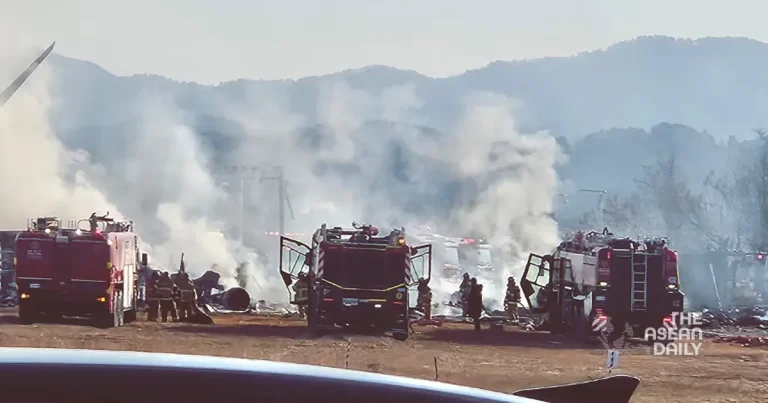30-12-2024 (SEOUL) South Korea’s deadliest aviation catastrophe, which claimed 179 lives at Muan International Airport, has sparked intense scrutiny as investigators explore multiple potential causes, including a reported bird strike.
The devastating crash of Jeju Air flight 7C2216 occurred on Sunday when the Boeing 737-800 aircraft, carrying 181 passengers and crew from Bangkok, made a belly landing without visible landing gear deployment before erupting in flames. Only two survivors were pulled from the wreckage.
Aviation experts have cast doubt on initial reports suggesting a bird strike as the primary cause. “Whilst bird strikes are commonplace in aviation, they rarely affect landing gear systems,” explains Matt Driskill, Asian Aviation magazine’s editor. “The absence of deployed landing gear is particularly puzzling, as these systems typically have redundant deployment mechanisms.”
The aircraft’s final moments were marked by a “mayday” distress call following air traffic control’s bird strike warning. However, independent aviation analyst Alvin Lie notes that bird strikes typically only affect engine performance: “Even in cases where birds disable an engine, this shouldn’t compromise landing gear functionality. Additional factors must be at play.”
South Korean authorities have launched a comprehensive investigation, joined by representatives from America’s National Transportation Safety Board, Federal Aviation Administration, and Boeing. While both flight recorders have been recovered, reports indicate the flight data recorder sustained partial damage, potentially complicating the investigation.
Particular attention is being directed towards a technical incident involving the same aircraft just days before the crash. The plane had been diverted to Incheon during a Jeju-Beijing flight on Friday, though it subsequently completed its journey to Beijing.
For Jeju Air, South Korea’s largest budget carrier operating since 2005, this marks their first fatal accident. The ill-fated aircraft, a 15-year-old Boeing 737-800 previously operated by Ryanair until 2017, had reportedly been well-maintained.
Aviation safety specialists anticipate the investigation will require several weeks to decode the recovered data and establish definitive conclusions. As Paul Charles, an aviation analyst, summarises: “We must await the investigators’ findings to determine whether engine malfunction or other mechanical issues may have been exacerbated by the reported bird strike.”




